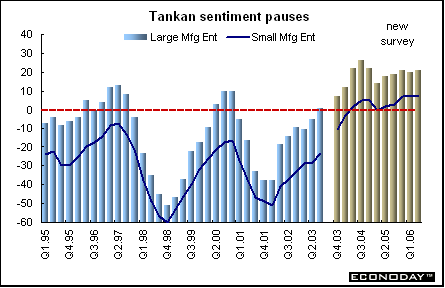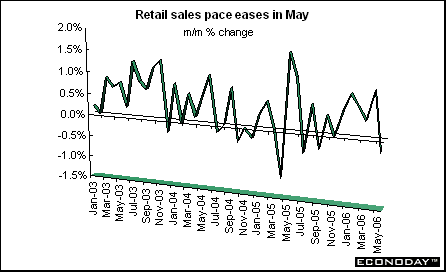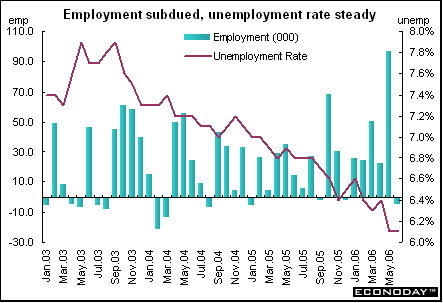Markets especially in Asia were shaken after North Korea defied international pressure and tested its missile systems on Wednesday (Asia time). However, the declines were relatively muted as investors took a wait and see attitude. But stocks also declined as markets opened in turn elsewhere. The yen dropped to a record low versus the euro and was down against the U.S. dollar as well. Japan, which is within range of North Korean missiles, and the U.S. are among nations that want North Korea to abandon its nuclear weapons program.
The North Korean test along with Iran's intransigence on nuclear development upset commodity prices once again and pushed crude to a record high above $75 a barrel. Concerns are swirling around possible supply disruptions. Political uncertainties are usually reflected in gold prices as well as crude. Gold prices also jumped last week as they usually do when there is a flight to quality.

As the week ended, equities were mixed with seven indexes down and six up on the week. Along with the Nikkei, Topix and Kospi, the Nasdaq is down from its year end level.
Global Stock Market Recap

Europe and the UK
It was a tough week, but investors proved to be somewhat resilient as they were buffeted by the uncertainties from political events, central bank uncertainties and the angst that usually swirls around the U.S. employment situation report. In Europe, they were also distracted by the excitement leading up to the World Cup final on Sunday, with Italy and France vying for the championship. In the UK the FTSE proved to be less volatile. Employment Friday generally impacts equity trading wherever markets are open and this one was no exception. Equities were up initially after employment increased much less than the consensus forecast. This was immediately interpreted to mean the Federal Reserve may pause or even end its series of interest rate increases. However equities were down after investors read beyond the headline number and saw that wages and hours jumped in June. This put a damper on investors' hopes of a halt in the interest rate cycle of increases. However, Europe's investors also had to deal with the likelihood of further rate increases by the ECB, possibly as soon as August.

ECB - there is a rate increase in the (very) near future
Analysts tend to become creatures of habit - they see a pattern emerging and assume that it will continue. A case in point - the expectations voiced ahead of the week's ECB meeting. At his press conference, ECB President Jean Claude Trichet systematically destroyed most of them. Analysts presumed that the next meeting on August 3rd would be held via conference call and without a press conference (August is high vacation season in Europe). They also presumed that a conference call would not be conducive to an interest rate move. Trichet proceeded to turn the tables. There will be a 'physical' meeting in August, and yes there will be a press conference also. Analysts also assumed the ECB was in a three-month cycle of interest rate moves and Trichet's wording in the press conferences followed a proscribed pattern. But on Thursday he did not use the 'meeting after an increase' language. Rather he used the words 'strong vigilance' only a month after an interest rate increase instead of waiting another month to invoke them. He also left little doubt that there would be another interest rate increase at that time. The ECB's policy interest rate is currently 2.75 percent.

Bank of England maintains status quo
While the ECB signaled a more rapid increase in interest rates, the Bank of England left its policy interest rate unchanged at 4.5 percent for the 11th month. It was no surprise. The Monetary Policy Committee has made it clear it would not increase rates without clearer signs of intensifying inflationary pressure in the economy. As usual, analysts will have to wait until July 17th to find out what transpired at the meeting. The Bank does not issue a post-meeting statement when no action is taken. The MPC, which consists of nine members, five from the Bank and four external members, is currently two external members short after the sudden death of David Walton last month and the failure to replace Richard Lambert after his resignation in March. The external members are Chancellor of the Exchequer Gordon Brown appointees.
Asia/Pacific
Asian markets were rattled on Wednesday after the North Koreans launched several test missiles into the Sea of Japan. The test particularly unnerved investors in Japan and South Korea as one would expect. However, while the Kospi, Nikkei and Topix were down on the week, the drops could have been much worse. And by the end of the week, the episode appeared to be fading and investors proved to be resilient.

The Japanese Cabinet Office has revised its fiscal year forecast upwards. Now real GDP is expected to grow at 2.1 percent and nominal GDP, at 2.2 percent. This projection shows nominal growth outpacing real growth for the first time in nine years. This supports the view that the Japanese economy is on track to overcome deflation during this fiscal year (which ends March 31, 2007). The GDP deflator, which has been cited as evidence that the economy still suffers from deflation, is projected to be up by the slimmest of margins - 0.1 percent. The deflator measures overall price movements and has been in negative territory since fiscal 1998.
RBA rate steady for 2nd month
The Reserve Bank of Australia left its policy interest rate unchanged for a second month after it increased it to 5.75 percent in May to curb inflation. A combination of low unemployment, which is at a 30-year low, increasing wages and soaring fuel prices have added to inflationary pressures. The RBA has an inflation target range of 2 to 3 percent over the business cycle. First quarter CPI was up 3 percent on the year.

Currencies
Both the yen and euro ended the week higher after the U.S. employment report disappointed traders and the U.S. dollar dropped. While relief was apparent in the bond market, the currency market would like to see higher interest rates. Equities were down as investors weighed the risks of slower U.S. growth and its corollary, lower profit gains.

The yen sank on Wednesday after the North Korean missile tests. But the currency rallied in the Asian session Friday after an unconfirmed rumor that the People's Bank of China was planning an emergency meeting (the PBoC meets quarterly). The rumors, which the Bank would not confirm or deny, prompted speculation there may be some further freeing of the renminbi, which was revalued by 2.1 percent in July last year. Most speculation centered on the possibility that the renminbi would be allowed to increase in value at a more rapid pace and possibly widen the maximum 0.3 percent daily trading band against the dollar.
Indicator scoreboard
EMU - May industrial producer prices were up 0.3 percent and 6 percent when compared with May 2005. Energy prices were flat on the month but were up 18.6 percent on the year. Intermediate prices were up 0.9 percent. Core PPI, which excludes construction and energy, was up 0.4 percent and 2.6 percent on the year.

May unemployment rate edged downward to 7.9 percent, the lowest rate since October 2001, from 8 percent in April. Unemployment declined in France, the Netherlands, Luxembourg, Portugal and Finland. It edged up in Germany while it was unchanged in Belgium, Spain, Ireland and Austria. While all countries follow the International Labour Organisation criteria in defining unemployment, differences can occur with Eurostat data because of adjustment processes and variations in the interpretation of the definition.

May retail sales were down 0.6 percent and up 0.7 percent when compared with last year. Sales for food, drinks & tobacco dropped 0.8 percent while non-food sales were down a more modest 0.4 percent.

June manufacturing purchasing managers' survey reading was 57.7, up from 57.0 in the previous month. Both output prices and input prices were up as were output, new orders and employment. Index readings above 50 signify growth and the higher the level the stronger the growth. Both Germany and Italy led member countries in their gains.

June services purchasing managers' survey reading was 60.7, up from 58.7 in May. Price changes were up but input prices eased. The major part of the gain stemmed from Germany where the World Cup has boosted demand for travel and associated tourism. When combined with the manufacturing, the composite reading surged to 60.4 from 59 in the previous month.

Germany - May manufacturing orders were down 1.2 percent but were up 10.9 percent when compared with the same month a year ago. Capital goods orders were down 2.6 percent but up 10.9 percent on the year, while consumer & durable goods were up 1.6 percent and 5.9 percent on the year. Domestic orders were up 1.9 percent and 9.7 percent on the year, while foreign orders dropped 4.2 percent but remained up 12.2 percent on the year.

May industrial production (excluding construction) was up 1.4 percent and 5.8 percent when compared with last year. Capital goods production jumped by 2.7 percent and 7.8 percent on the year. However, consumer goods edged downward by 0.1 percent but were up 3.4 percent on the year. The weakness in consumer goods stemmed from nondurable production which was down 0.7 percent while durable production was up 2.7 percent on the month.

Britain - May industrial production was up 0.3 percent and down 0.7 percent when compared with last year. Manufacturing output was up 0.7 percent and 0.9 percent on the year. Nine of 13 manufacturing sectors were up on the month. Electrical and optical equipment output was up 2.1 percent while chemicals and man-made fibers were up 1.6 percent.

Asia
Japan - Second quarter Tankan survey of large manufacturers edged upward to a reading of 21 from 20 in the previous quarter. Small manufacturers reading remained unchanged at 7. The largest companies plan to increase investment spending by 11.6 percent in this fiscal year ending March 31, 2007. The survey measures positive vs. negative sentiment. The Tankan surveyed 9,964 companies between May 31st and June 30th. The survey asks companies about their outlook for indicators including sales, profits, capital spending, hiring and prices. The spending plans of the largest companies are the strongest since the year ended March 1991.

Australia - May retail sales were down 0.3 percent but up 5.2 percent when compared with last year. The decline was attributed to surging gasoline prices during the month that pinched household spending. Department store sales declined 1.9 percent while spending on clothes and pharmaceuticals both dropped 1.4 percent.

Americas
Canada - June employment edged downward by 4,600 jobs while the unemployment rate remained at 6.1 percent for the second month. Full time employment declined by 67,100 jobs while part time employment increased by 62,500 jobs. Manufacturing employment was down by 4,100 jobs with losses centered in food, paper and textile manufacturing. Jobs were down by 34,700 in goods producing sector while they were up by 30,200 in services.

Bottom line
Two central banks meet this week, the banks of Canada and Japan. Of the two, the BoJ meeting is politically and economically charged. Pieces are falling into place for the end of ZIRP (zero interest rate policy). The Cabinet Office raised its forecast for Japanese growth Friday to 2.1 percent and acknowledged that deflation has ended. This leaves the path open for the BoJ to increase its policy rate for the first time since its abortive attempt to do so in over five years. The financial markets have been expecting an interest rate increase for several months, ever since the BoJ announced that it would begin to normalize monetary policy in March.
Economic data support the BoJ. Unemployment is at an eight-year low and there has been a firm increase in the core CPI. The Tankan survey has also given credence to the Bank's position. Analysts do not think that the scandal surrounding BoJ governor Toshihiko Fukui, who has been pressured to resign after his disclosure last month that he had invested in a controversial fund whose manager has been indicted for insider trading, would deter the bank from acting. Some powerful figures within the government do not want the BoJ to raise rates so soon and there is speculation that officials may use Fukui's predicament to pressure him into holding off a rate increase.

